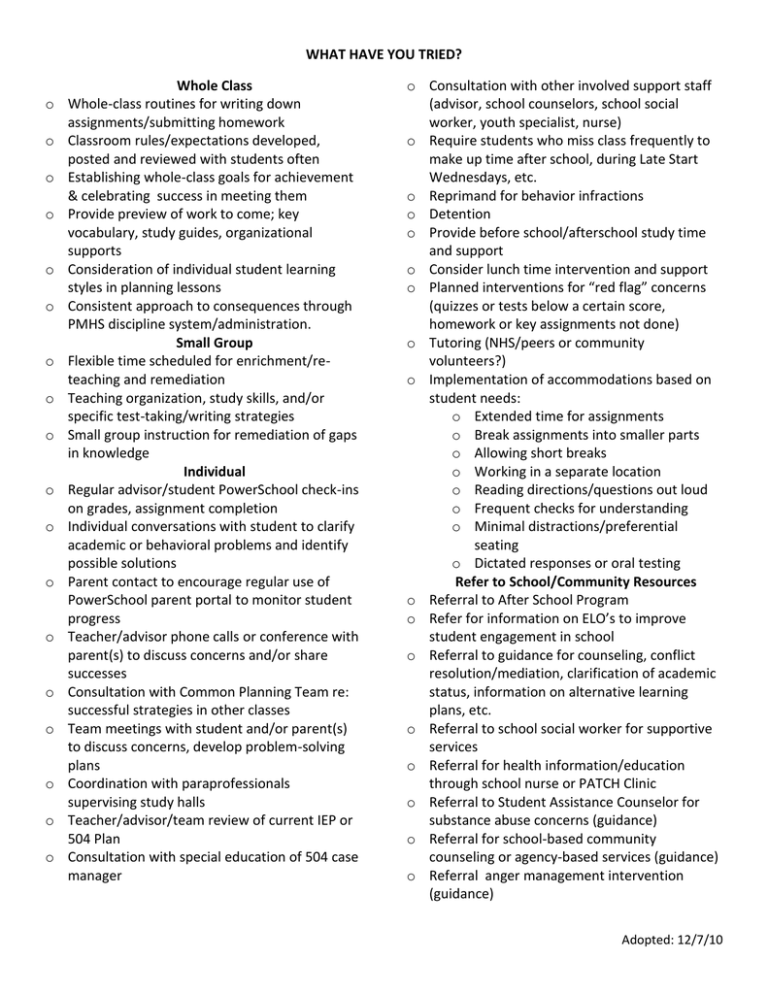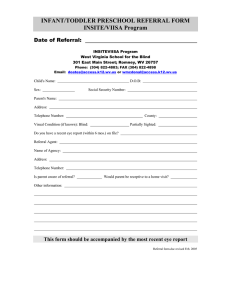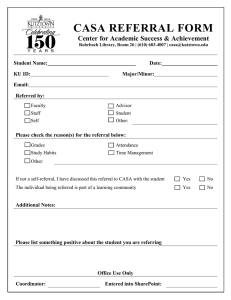WHAT HAVE YOU TRIED? Whole Class
advertisement

WHAT HAVE YOU TRIED? Whole Class o Whole-class routines for writing down assignments/submitting homework o Classroom rules/expectations developed, posted and reviewed with students often o Establishing whole-class goals for achievement & celebrating success in meeting them o Provide preview of work to come; key vocabulary, study guides, organizational supports o Consideration of individual student learning styles in planning lessons o Consistent approach to consequences through PMHS discipline system/administration. Small Group o Flexible time scheduled for enrichment/reteaching and remediation o Teaching organization, study skills, and/or specific test-taking/writing strategies o Small group instruction for remediation of gaps in knowledge Individual o Regular advisor/student PowerSchool check-ins on grades, assignment completion o Individual conversations with student to clarify academic or behavioral problems and identify possible solutions o Parent contact to encourage regular use of PowerSchool parent portal to monitor student progress o Teacher/advisor phone calls or conference with parent(s) to discuss concerns and/or share successes o Consultation with Common Planning Team re: successful strategies in other classes o Team meetings with student and/or parent(s) to discuss concerns, develop problem-solving plans o Coordination with paraprofessionals supervising study halls o Teacher/advisor/team review of current IEP or 504 Plan o Consultation with special education of 504 case manager o Consultation with other involved support staff (advisor, school counselors, school social worker, youth specialist, nurse) o Require students who miss class frequently to make up time after school, during Late Start Wednesdays, etc. o Reprimand for behavior infractions o Detention o Provide before school/afterschool study time and support o Consider lunch time intervention and support o Planned interventions for “red flag” concerns (quizzes or tests below a certain score, homework or key assignments not done) o Tutoring (NHS/peers or community volunteers?) o Implementation of accommodations based on student needs: o Extended time for assignments o Break assignments into smaller parts o Allowing short breaks o Working in a separate location o Reading directions/questions out loud o Frequent checks for understanding o Minimal distractions/preferential seating o Dictated responses or oral testing Refer to School/Community Resources o Referral to After School Program o Refer for information on ELO’s to improve student engagement in school o Referral to guidance for counseling, conflict resolution/mediation, clarification of academic status, information on alternative learning plans, etc. o Referral to school social worker for supportive services o Referral for health information/education through school nurse or PATCH Clinic o Referral to Student Assistance Counselor for substance abuse concerns (guidance) o Referral for school-based community counseling or agency-based services (guidance) o Referral anger management intervention (guidance) Adopted: 12/7/10

